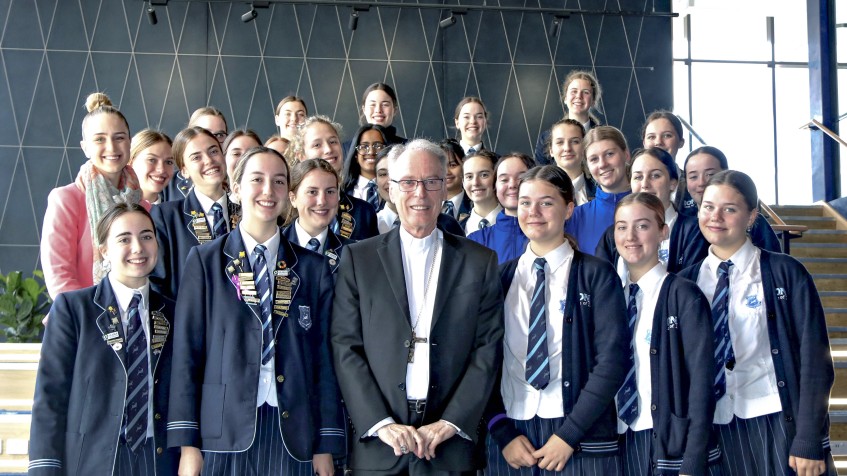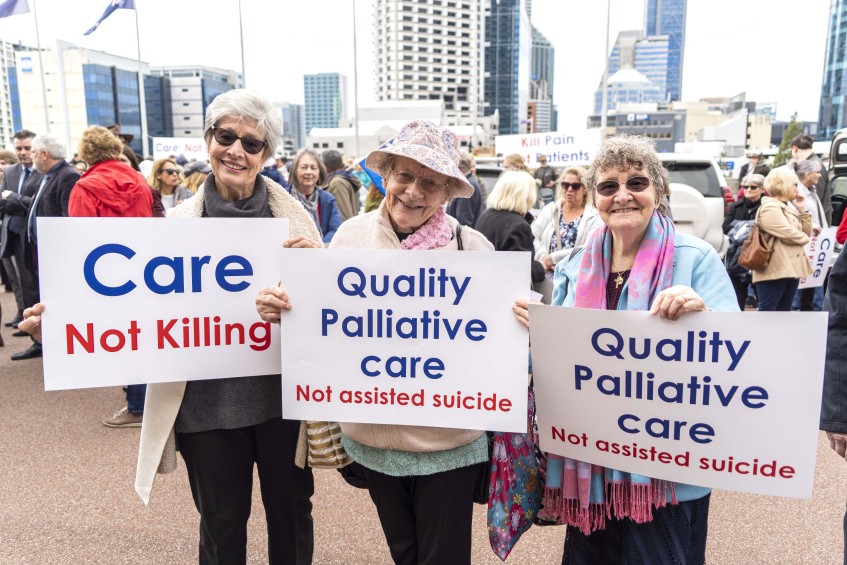Bishop Sproxton covers moral issues of assisted suicide to Iona students

Perth Auxiliary Bishop Donald Sproxton enjoyed a Q&A session with students from Iona Presentation College following his address on euthanasia, on Thursday 17 September. Photo: Supplied.
By Eric Martin
Speaking on an issue vexing enough for experienced Christians to comprehend, let alone teenagers and students, Auxiliary Bishop Donald Sproxton visited Iona Presentation College last Thursday, 17 September, to give a presentation to Year 12 Religion and Life ATAR pupils on the topic of Voluntary Assisted Dying.
Euthanasia became part of reality in Western Australia when the state’s Voluntary Assisted Dying Legislation was passed on 10 December 2019, impacting lives across the Catholic community as individuals and families struggled to come to terms with this sudden reversal in medical and legal perspectives on the sanctity of life – both as moral agents of the Church and as children and grandchildren, faced with the potential suffering of an elderly loved one.
“The deeper need is [for the sick] to be helped and loved,” Bishop Sproxton explained to Iona pupuls.
“What a sick person needs, besides medical care, is love, the human and supernatural warmth with which the sick person can and ought to be surrounded by all those close to him or her, from their parents and children, doctors and nurses.
“On one hand we must never deliberately and directly take anyone’s life, but on the other hand, neither are we obliged to keep people alive indefinitely.”
Bishop Sproxton was actively involved in lobbying the State Government with regard to the Church’s position on the Voluntary Assisted Dying Legislation and was invited to the school by Gemma Thomson, Iona’s Dean of Mission and Catholic Identity, after hearing his delivery on the topic at the Australian Catholic Youth Festival in December 2019 whilst the debate was a hot topic.
“I was at ACYF and wanted to take our students to see it, but it was so popular that the session was full,” Ms Thomson told The eRecord.
“We believe that it is of great importance that our Year 12s leave the college having an informed understanding of current issues such as euthanasia.
“We had taught the syllabus content in class, however, we were looking for a ‘real-world connection’, so having Bishop Sproxton come to speak to the students, as both students and young Catholics, was hugely beneficial.
“He was able to clearly and intricately explain the Church’s response to euthanasia and particularly, the Catholic perspective on suffering [this is often a point that students raise with regard to euthanasia], as well as explaining how palliative care works and unpacking what this looks like in practice,” she elaborated.
“It is so important for young people to see clergy as multi-faceted individuals who have many gifts and talents to share with the world, so having the opportunity to engage with Bishop Sproxton as a ‘teacher’ in an academic learning environment was a wonderful experience for our students and staff”.

Western Australia’s Voluntary Assisted Dying Legislation was passed on Tuesday 10 December 2019 and is still a contentious issue within the community, especially for Catholics. Photo: Josh Low.
In the Year 12 Religion and Life course (both ATAR and General), studied by all students in Catholic schools across WA, the syllabus looks at current issues and the ways in which religions interact and respond to current issues such as euthanasia, abortion, homelessness, treatment of refugees and migrants.
Each school picks a current issue that they deem of interest to their school community and the students in the course.
A morning tea followed Bishop Sproxton’s address on 17 September, where he was joined by a group of students who were able to ask him a range of questions such as the formation of priests, whether priests will ever be able to marry, some of the tasks that he carries out as bishop, and how his time in Israel in 2017 impacted his faith journey.
“It is vital that young people in Catholic schools are afforded the opportunity to see clergy as ‘humans’ as well as priests, and to have Bishop Sproxton speak of his own interactions with euthanasia at various levels, highlights that no matter our role in society, we are all humans created by God, who are affected by such current issues,” Ms Thomson added.
“Having the opportunity to interact with a bishop as part of teaching and learning was a priceless opportunity given their breadth of knowledge and commitment to their faith.”
With the legalisation of assisted suicide and euthanasia in many countries, and questions concerning what is morally permissible regarding end-of-life care, the Vatican’s doctrinal office released a 25-page letter offering “a moral and practical clarification” on the care of vulnerable patients.
“The Church is convinced of the necessity to reaffirm as definitive teaching that euthanasia is a crime against human life because, in this act, one chooses directly to cause the death of another innocent human being,” the document said.
Titled ‘Samaritanus bonus’, on the Care of Persons in the Critical and Terminal Phases of Life, the letter by the Congregation for the Doctrine of the Faith was approved by Pope Francis in June, and released to the public on 22 September.
